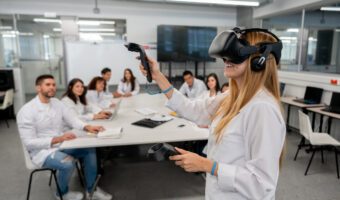Program Overview
Channel your creativity and eye for design into a bachelor’s degree in Graphic Design. Develop skills combining web content management, ePublishing, branding, logo design and development, SEO, web video, animation, and social media marketing. Master cross-media content delivery via ePub and mobile devices, and create a “branded” portfolio to set you on your career path.
Read More Building upon the core design principles and technical skills developed in the associate degree program, the Graphic Design bachelor’s degree program further prepares students for positions in a wide variety of emerging new media careers. Students will develop interdisciplinary skills combining web content management systems, e-publishing, branding, logo design, packaging design, search engine optimization, web video, animation, and social media marketing. Each student will graduate with their own self-branded, online portfolio showcasing their creative content in the form of galleries and case studies, which can then be shared with potential employers. The dynamic combination of skills obtained in the Bachelor of Science Degree in Graphic Design are valued in a wide variety of fields, including advertising and promotion, public relations, packaging design, web design, digital publishing, social media, and other visually creative career paths.Full Description
Potential Career Opportunities
The Graphic Design bachelor’s degree can lead to a number of exciting employment opportunities. Career goals may include the following titles:
UI/UX Designer
Website Designer
Social Media Marketer
Augmented Reality Developer
Art Director
Mobile Interface Designer
E-PUB Designer
Motion Graphics Animator
Brand Designer and Marketer
FAQ
-
What is a graphic designer?
Graphic designers, multimedia artists and animators combine text, audio and visual materials to create compelling and informative content. They are able to work with various media including web, television, film, video games and more.
-
What is a Graphic Design degree?
A graphic design degree provides a general education in visual arts, interactive media, information technology, communications and business. Programs will help college students take the next step in their professional journey as multimedia designers.
-
Is graphic design a good degree?
If you are interested in digital media, then a career in graphic design is a great option to pursue. Multimedia designers can entertain different career options across a variety of industries, from film and television, video game production and more.
-
What is a design degree?
Design degrees will introduce students to both creative and technical skills to prepare them for the professional world. Degree programs may focus on different areas including web development, computer programming languages, digital imaging, drafting, art and animation.




